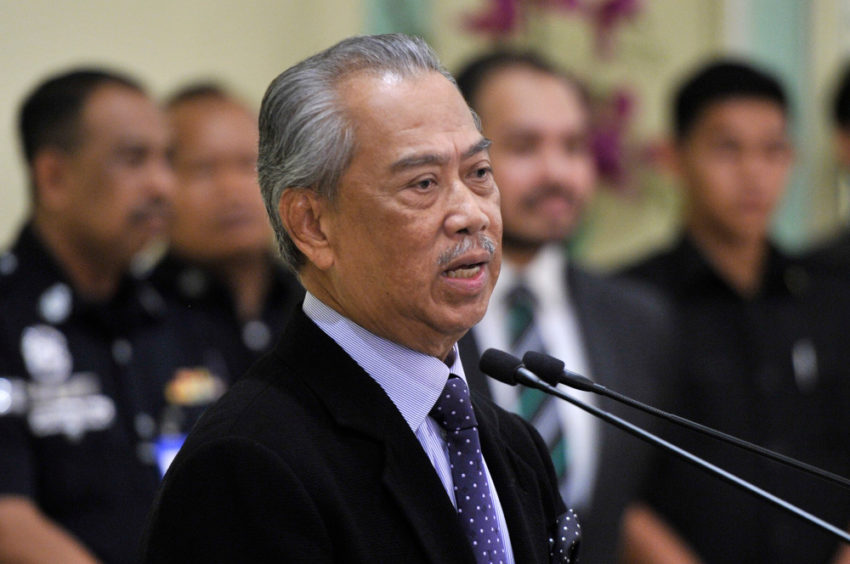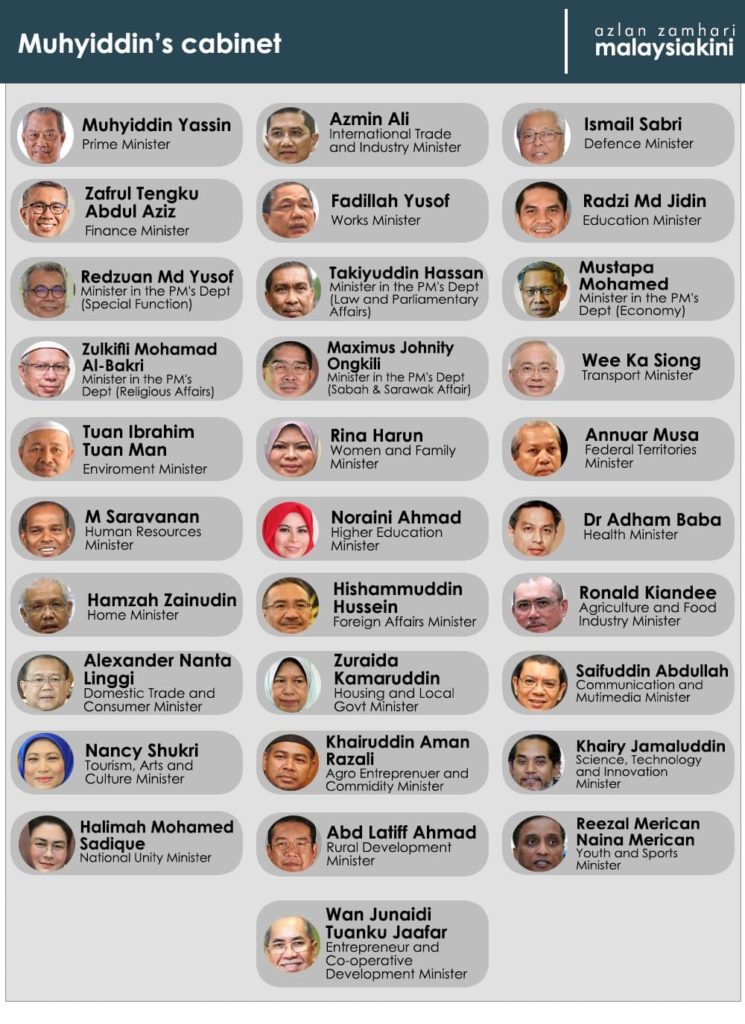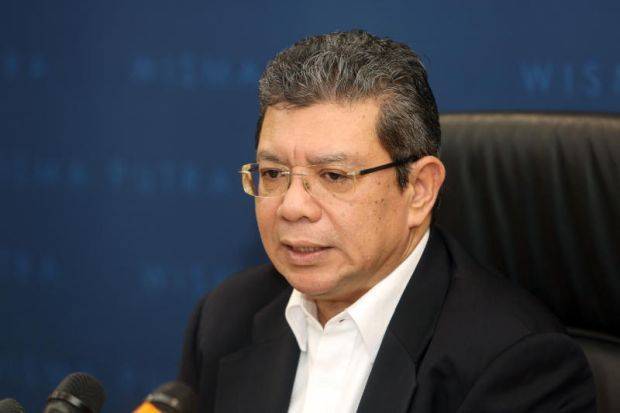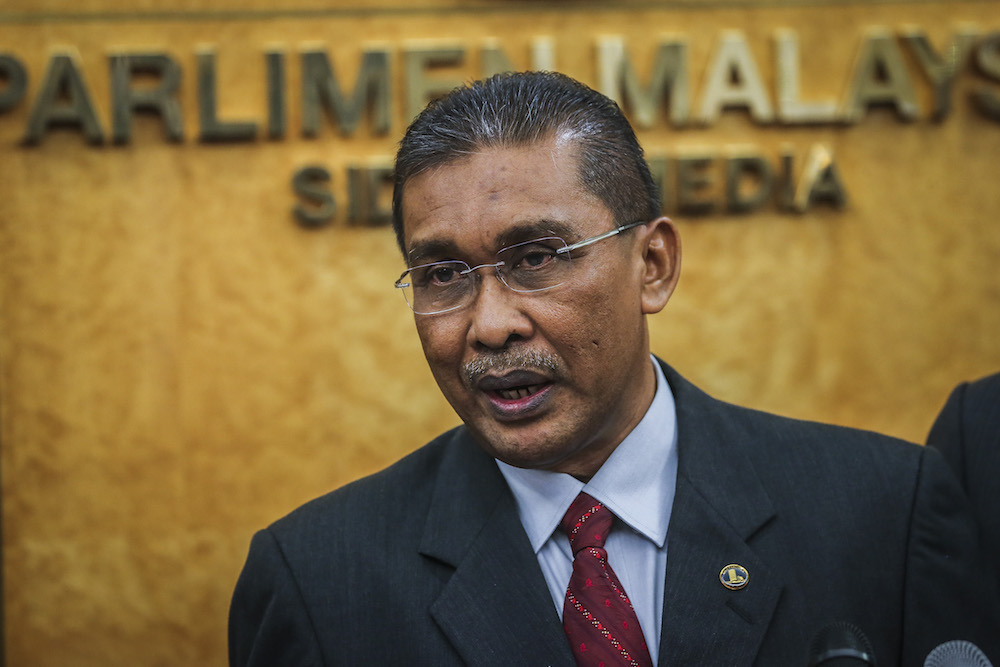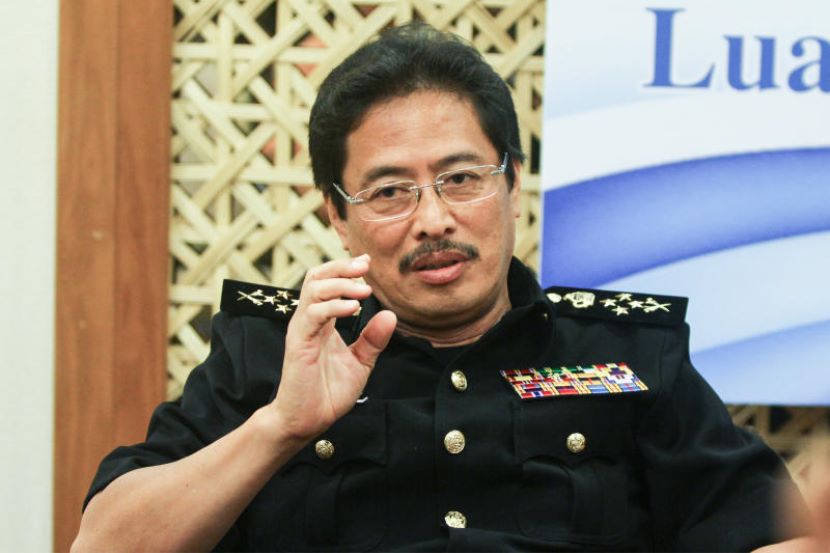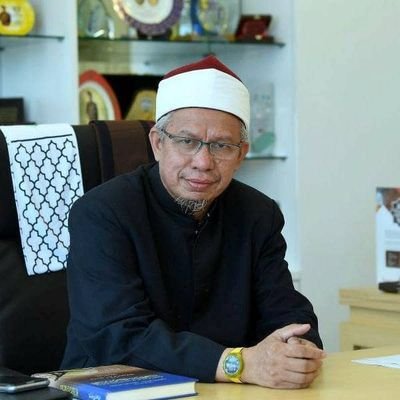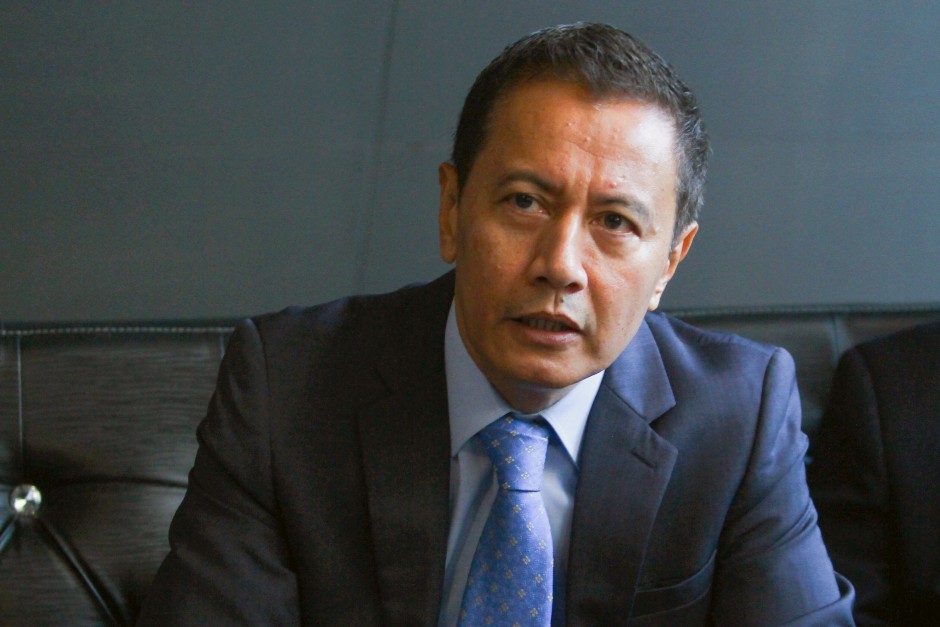After much suspense, Prime Minister Muhyiddin Yassin unveiled his new Cabinet today. We take a look at what this means for rule of law, democracy & human rights in Malaysia.
1. Freedom of Speech, Assembly & Association
Many expect political heavyweights to helm this crucial Cabinet post, but it went to an unlikely (and relatively obscure) candidate: Hamzah Zainuddin. A former Minister of Domestic Trade, Cooperatives and Consumerism under BN from 2015-2018, he stood by Prime Minister Najib Razak and only defected to PPBM in December 2018 after GE14.
If his track record is any indication, Hamzah Zainuddin is the quintessential boomer UMNO Minister: a yes-man, will not rock the boat and governs conservatively. Hence, civil society should not expect freedoms of speech, assembly and association to be better safeguarded under this new administration.
The silver lining however lies in newly minted Minister of Communications & Multimedia, Saifuddin Abdullah. One who has always preached moderation, open-ness and freedoms in the past, citizens can hope that liberties in the cyberspace would not be excessively policed.
However, his recent switch to Perikatan Nasional has drawn vilification and many would be forgiven to conclude he has become a changed man. Only time will tell.
2. Law Reform
The next most crucial Cabinet post is that of the Minister in charge of Parliamentary and Legal Affairs: he/she is the coordinating Minister insofar as all law reforms are concerned. Ominous dark days are ahead with Takiyuddin Hassan helming this post. The PAS Secretary-General is hardly a progressive and has in fact adopted conservative-nationalistic stances in the past.
This means reforms on the introduction of the IPCMC, death penalty, Sedition Act, women’s rights and many more – which were pursued by Liew Vui Keong of Warisan previously – will likely come to a halt. Takiyuddin could also use this opportunity to spearhead hudud law in Malaysia. It is also unclear if Takiyuddin would interfere with the independence of the Bar Council – something the BN Government tried to do in the past.
However, Perikatan Nasional as a whole is unlikely to be able to easily pass legislation in the Dewan Rakyat due to the razor thin (some say non-existent) majority. The next few Parliamentary sessions are not expected to be productive insofar as law-making is concerned.
3. The AG & High Profile Criminal Trials
Not directly related to the Cabinet – but an all-powerful and key government organ. In the aftermath of the 1MDB scandal, the world and the rakyat are keeping a close eye on how the Malaysian Government deals with high profile corruption cases. This is inextricably linked with Malaysia’s reputation as a “clean” nation with a functioning criminal justice system and independent institutions. It is hence reassuring that Gopal Sri Ram, the lead prosecutor against Najib, has said that the new AG has given the green light to continue with the existing trials.
The new AG, Idrus Harun, has considerable experience within the legal services and Judiciary. Some have raised concerns on several of his more recent judgments – he was part of the Court of Appeal bench which held that Najib is not a “public officer” (overruled by the Federal Court subsequently) and also in the majority in the Federal Court’s decision in the “Bin Abdullah” case which held that an illegitimate Muslim child cannot bear his/her father’s name.
He has nonetheless made some progressive judgments: he dissented in the Federal Court decision of JRI Resources which many believe has watered down the significant impact of Semenyih Jaya and Indira Gandhi on judicial power. One can hope that Idrus Harun will act without fear or favour in pursuing wrongdoers – however influential they may be – to justice.
4. Anti-Corruption Efforts
Corruption has plagued this beautiful nation for decades. Therefore, many will place high hopes on Azam Baki, Muhyiddin’s newly appointed MACC Chief. A longtime servant in MACC, not much is known publicly on his character. We will need time to assess whether he would be an effective watchdog and graftbuster.
It is also unknown if the National Centre for Governance, Integrity and Anti-Corruption (GIACC) established by Mahathir – and headed by the long-praised former MACC Chief Abu Kassim – would continue to play an important role in this new administration
5. Religion & Minority Rights
A surprise and welcome appointment of Zulkifli Mohamad Al-Bakri as Minister of Religious Affairs. Widely hailed as a progressive and moderate in his previous role as Mufti of the Federal Territories, many will look at him as a beacon to pacify any extreme religious narrative which may potentially be driven by elements within Perikatan Nasional.
6. Women and Children Rights
There’s only one word which exemplifies Rina Harun: lacklustre. Hardly making any impact in her previous role as Minister of Rural Development, her appointment as Minister of Women & Family Development is in stark contrast to the very dynamic (and much loved) duo of Wan Azizah and Hannah Yeoh. It is a real shame because many reforms are in the pipeline when it comes to child marriage, anti-sexual harassment and women’s rights. Expect this Ministry to be…well, lacklustre.
7. Environment & Native Rights
Tuan Ibrahim Tuan Man as Minister of Environment. Where in Gaia’s name do I begin? PAS’ experience in Kelantan when it comes to logging and native rights is not exactly reassuring in its commitment for environmental protection in Malaysia. The Federal Government’s suit against Kelantan on behalf of the indigenous people will likely be withdrawn.
A far cry from the young & energizing Yeo Bee Yin, who went to great lengths to showcase Malaysia as an up-and-coming green economy. “Bagaikan kera mendapat bunga” is the peribahasa which comes to mind.
8. Parliament
So, what next in Parliament? One can be optimistic that Ariff Yusof will still be the Speaker after this political tectonic shift – unless he is removed as Speaker pursuant to a vote of no confidence, which is a remote possibility at the moment.
But expect the dozens of Parliamentary Select Committees to be overhauled and new members appointed. As mentioned earlier, law-making would likely be paralysed. There may also be a thunderbolt in the form of a vote of no confidence – it will be interesting whether Muhyiddin’s Cabinet lineup will be strong enough to hold Perikatan Nasional + GPS together.
9. Judiciary
As the Executive and Legislature is plunged into turmoil, the Judiciary under Tengku Maimun Tuan Mat – who still has around 6 years as Chief Justice – is a sight for sore eyes. The Courts are slowly regaining the lustre of its former glory days. The Judicial Appointments Commission is still helmed by highly respected and independent members.
Although Muhyiddin as PM wields considerable say in judicial appointments and promotion, he is expected to allow the Judiciary to rebuild itself. The PM also cannot easily interfere with the Judiciary as removal of any judges is constitutionally protected and can only be done through a tribunal. Judicial independence and courage – values lauded by the Chief Justice of late – will be a crucial bulwark against Executive and Legislative aggression, which may come in droves under this new administration.
10. Election Commission
The EC Chief has vowed to stay on. That is good news. Like the Judiciary, a tribunal must be instituted before the EC Chief and members can be removed. Free and fair elections is something that we can continue to see being practiced in GE15 and the possible by-elections in between. It is a luxury which the rakyat were unable to enjoy for the past many general elections.
11. A Blow to Racial, Gender & Youth Representation
Racial, gender & youth representation in this Perikatan Nasional Cabinet is a far cry from the Pakatan Harapan Cabinet.
Only 19%, or 6 out of 31 Cabinet Ministers (Wee Ka Siong, M Saravanan, Alexander Nanta Linggi, Maximus Ongkili, Ronald Kiandee & Nancy Shukri), are from minority races. There is only 1 Chinese and 1 Indian Minister, which many view is disproportionate to the 20.6% Chinese and 6.2% Indian population. Contrast this with 37%, or 10 out of 27, minority racial representation in Pakatan Harapan’s Cabinet.
Gender representation is even worse: only 16%, or 5 out of 31 Cabinet Ministers (Rina Harun, Nancy Shukri, Noraini Ahmad, Zuraida Kamaruddin and Halimad Sadique) are women. Pakatan Harapan was not much better at 18%, but it at least had a women Deputy Prime Minister.
Youth representation is at its lowest ebb in the Perikatan Nasional Cabinet. None are younger than 40. Pakatan Harapan had Syed Saddiq and Yeo Bee Yin at 27 and 35 years old when they were appointed Cabinet Ministers.
